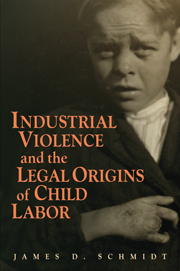4 - Natural Impulses
Published online by Cambridge University Press: 05 June 2012
Summary
Children, wherever they go, must be expected to act upon childish instincts and impulses.
(Thomas McIntyre Cooley, 1884)Walter Clark, member of the Supreme Court of North Carolina throughout the Progressive era, holds the distinction of being one of the few jurists in U.S. history to quote Elizabeth Barrett Browning (poorly) in a judicial opinion. Reviewing the cause of William Fitzgerald against the Alma Furniture Company in 1902, Clark turned to Browning's famous verses. Following a lengthy list of child labor statutes in the United States and around the world, Clark placed these stanzas: “The sob of the child in its helplessness/Curses deeper than the strong man in his wrath.” Although garbling the lines, Clark captured the essence of Browning's reforming rhymes. This literary flourish epitomized the opinions Clark wrote over the three decades on the court, texts that imported much of the language reformers were busy articulating. In these texts, he decried “the inhumanity of shutting up these little prisoners eleven and one-half to twelve hours a day … or depriving them of opportunity for education, or using the competition of their cheap wages to reduce those of maturer age.” Speaking of Joe Pettit's death in a South Rocky Mount rail yard, Clark exclaimed: “This was truly ‘the price of innocent blood’.” Young Pettit was a “little sufferer” sent to his death by the “avarice” of the railroad.
- Type
- Chapter
- Information
- Industrial Violence and the Legal Origins of Child Labor , pp. 118 - 163Publisher: Cambridge University PressPrint publication year: 2010

